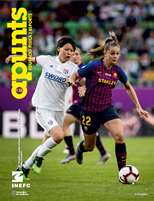Relative Age Effect in Professional Football: Influence of Competitive Level and Playing Position
Article Sidebar

Main Article Content
Relative age effect refers to the physical and psychological differences among subjects born earlier or later
in the same year. The objective of this study was to analyse this phenomenon in Spanish professional football, identifying the influence of competitive level and playing position. The sample comprised 5748 players of three different levels in the 2011-16 seasons: first division (n = 2530), second division (n = 2749) and national teams (n = 469). The statistical analysis was based on the chi-square test followed by the calculation of the odds ratios and the 95% confidence interval. The main results revealed an overrepresentation of players born in the early months in all levels, with a greater difference in the sample of national team players. This overrepresentation was found in all positions with the exception of wingers. It may be concluded that the structure of professional football in Spain fosters the appearance of this phenomenon, probably due to the early selection processes.